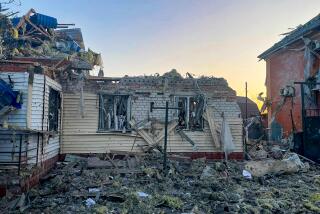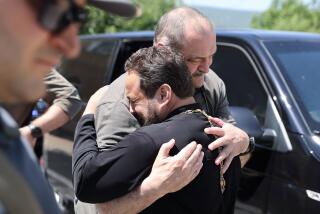Russians Hunt Attackers as War Spills Beyond Chechnya
- Share via
MOSCOW — Russian troops swept into three regions of the Caucasus on Tuesday on orders from President Vladimir V. Putin to “track down and destroy” Chechen insurgents who killed at least 57 people in one of the biggest displays of coordinated firepower in their 10 years of war.
The attack in the Russian republic of Ingushetia, Chechnya’s neighbor to the west, mocked Kremlin assertions that it had managed to end the Chechen conflict. Fighters only recently dismissed by the Kremlin as “bandits” and “pockets of resistance” engaged in a nightlong gunfight that left the streets of Ingushetia littered with bodies, wrecked military vehicles and charred automobiles.
In the aftermath, Russian authorities surrounded three Ingush towns Tuesday and were conducting anti-rebel roadblocks and passport checks in Chechnya and another nearby Russian republic, Dagestan.
Ingushetia has been a relative haven for tens of thousands of Chechen refugees seeking shelter from the war between Russian forces and separatists in their home region. In the attack that started late Monday, the insurgents appeared to focus on symbols of Russian authority in the region.
In a grim meeting with Putin and his senior security officials, Russian Interior Minister Rashid Nurgaliyev reported that Chechen rebels were able to cut off all main roads into the Ingush city of Nazran, including the main Caucasus Highway, and launch nine nearly simultaneous strikes in three towns against police stations, Interior Ministry buildings, border guard units and a motor rifle garrison.
“The federal authorities have not done enough to protect the republic,” said Putin, who ordered the deployment of a regiment of Interior Ministry troops to Nazran during a visit to the region late Tuesday.
“I hope you do everything to investigate these crimes within the shortest time possible, and find and expose all the organizers and all the participants.... Look for them for as long as it takes; the quicker the better,” the Russian president said.
An estimated 300 to 500 rebel fighters were involved in the operation, which followed Chechen separatist leader Aslan Maskhadov’s promise this month to step up offensive military operations.
Coming just six weeks after the assassination of Chechen President Akhmad Kadyrov, the attack left in doubt Russia’s plan to gradually withdraw federal forces from Chechnya and hold presidential elections there in August in an atmosphere of calm.
“The Chechen rebels have proved that this is not only a war in Chechnya; it’s much more. It is spreading across the Caucasus. It took place now in Ingushetia. It could take place next in Dagestan, or elsewhere. It means there is no frontier -- none,” said Alexei Malashenko of the Carnegie Moscow Center.
“I think Putin and the people around him have to react. They have to do something,” he said.
Russia warned the Parliamentary Assembly of the Council of Europe that in the wake of the attacks it had the right to take any measures to protect its citizens, “including the complete destruction of hotbeds of terrorism on the territory of the Chechen republic.”
Authorities said the number of bodies burned in vehicles and elsewhere around Nazran, the center of the fighting, made it impossible to determine a final death toll.
During an overnight operation that lasted more than seven hours, insurgents roamed the streets of Nazran, about an hour’s drive from the Chechen capital, Grozny, opening fire on passing civilian vehicles and ambulances. Electricity and telephone service at the Interior Ministry were cut off as the attack began.
The Russian military rolled in an armed convoy from nearby North Ossetia and responded with a thunderous volley of fire, designed in part to shore up the confidence of 15 police officers who had defended the Interior Ministry for six hours.
Maj. Alexei Baygushkin of the Federal Security Service, or FSB, in the Ingush capital, Magas, about three miles from Nazran, said the former agency headquarters came under intense fire and the district police station “was simply burned to ashes” after being hit with rocket-propelled grenades. A total of 15 government buildings came under attack.
“We stayed awake all night long watching the sky light up, tracer bullets flying like little stinging wasps back and forth. And finally, this glare went up over the dark city. We were later told that it was the police building catching fire,” Baygushkin said in a telephone interview.
The rebels, he said, “were shooting right and left, sparing not even civilian cars, ambulances, women and children. There were some hideous incidents overnight -- the rebels even executed a pregnant Ingush woman.... It was a large-scale massacre, a real bloodbath.”
Usam Baysayev, a Chechen employee of the human rights group Memorial, said the town thundered with exploding shells.
“It was a full-blown war inside the city, nothing less than that,” he said.
The sense of security in Ingushetia has been shattered, Baysayev added. “After last night’s tragedy, it is totally gone. Just as our hope for a better life -- it is gone as well,” he said.
Acting Ingush Interior Minister Abukar Kostoyev was killed when his car was attacked as he attempted to drive to his office shortly after the raid began.
Also among the dead were Deputy Interior Minister Zyaudin Kotiyev; Nazran prosecutor Mukharbek Buzurtanov; district prosecutor Bilan Oziyev; the former head of the territorial migration service, Magomed Gireyev; and United Nations employee Magomed Getagazov.
Police said rebels disguised themselves as commandos and stopped passersby on the road.
“Those who showed law enforcement identification cards were immediately shot dead,” Interior Ministry spokesman Yakhya Khadziyev told the Interfax news service.
After tightening security at the airport and railroads and blocking roads all over the region, authorities announced that at least two rebels were found dead in Nazran and three others “of different nationalities” had been arrested. But others had slipped into the thick forests and deep gorges on the frontier of the two republics.
Anna Politkovskaya, a journalist for Novaya Gazeta who has covered the war in Chechnya for years, said witnesses told her that some of the rebels were native Ingush -- an indication that the war may not only be spreading, but developing bases of support outside Chechnya.
A spokesman for Chechen rebel leader Maskhadov, Akhmed Zakayev, told Reuters in London that Tuesday’s operation was led not by Maskhadov, but by an Ingush commander who had fought under Maskhadov in Chechnya. He identified him only as Magomed.
Chechnya’s interior minister, Alu Alkhanov, who is considered the front-runner to replace slain President Kadyrov, said Tuesday that he had evidence that warlord Shamil Basayev masterminded the attack. Basayev led a similar rebel raid into neighboring Dagestan in 1999 that was one of the triggers for Russia’s second war in Chechnya.
“More and more young Ingush men have become drawn into the resistance movement,” Politkovskaya said.
“Clearly, this raid shows the fighters’ ability to carry out large-scale operations,” she said. “Regrettably, last night’s events killed all hopes that the Chechnya war could be brought to an end in any foreseeable future.”
Alexei V. Kuznetsov of The Times’ Moscow Bureau contributed to this report.
More to Read
Sign up for Essential California
The most important California stories and recommendations in your inbox every morning.
You may occasionally receive promotional content from the Los Angeles Times.













